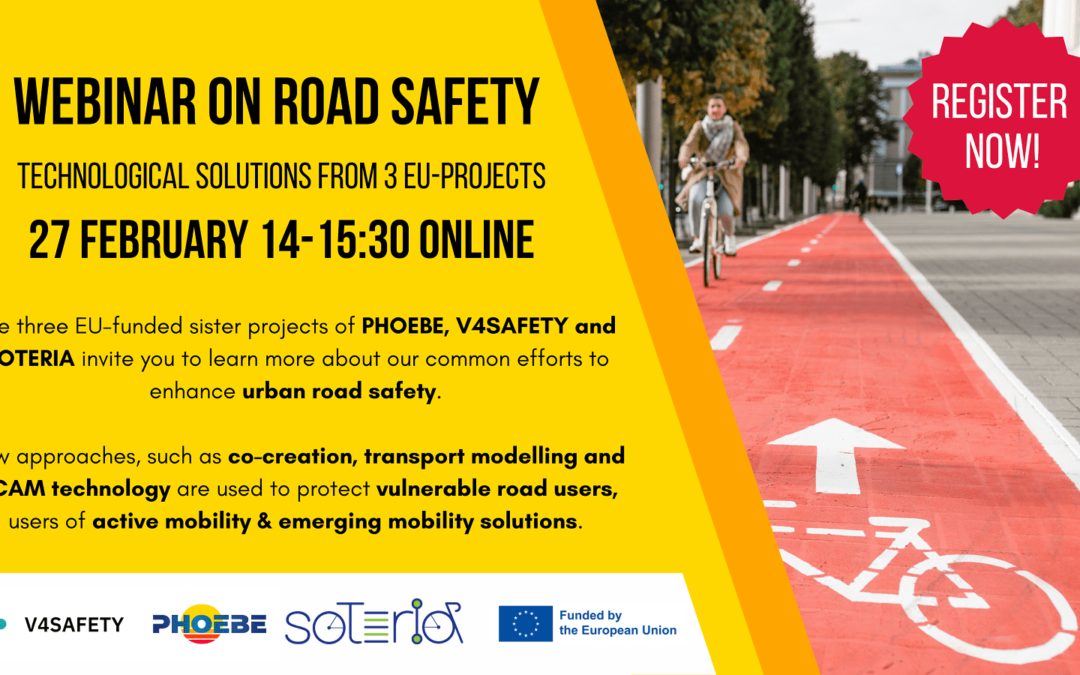Safer urban mobility is on the way across Europe with three highly innovative sister projects – PHOEBE, SOTERIA and V4SAFETY. Sixty stakeholders attended a recent webinar on 27 February to hear about the projects’ planned state-of-the-art solutions for transport modelling to improve road safety, especially for vulnerable road users in the European Union.
Watch the Webinar
Webinar Summary
Since all three projects stem from the same EU funding call, cooperation between the three consortia was a logical consequence. Even though the projects started in the second half of 2022, opportunities to present the aims, goals and challenges of the projects provided a good first opportunity.
The 90-minute session started with an introduction to the current road safety challenges and the affecting aspects of the still car-centric urban planning by Pedro Homem de Gouveia, POLIS ‘safety & security’ working group leader. The transport expert used various examples from epidemiology and workplace safety, which highlighted that societal progress and the willingness to adapt often lacks behind research and innovative solutions. Nevertheless, de Gouveia remains positive about a safer future for all road users.
The first project presentation focused on the use cases, methodology and pilot cities of the PHOEBE project, which was showcased by James Bradford (iRAP). The latter are Valencia, Athens and West Midlands, which have different focuses, including testing the effectiveness of infrastructure enhancements for cyclists and e-scooters users, as well as vulnerable road users across several traffic scenarios.
SOTERIA followed PHOEBE as the second project, which tries to tackle the challenges of road fatalities of vulnerable road users (VRUs), as a significant majority of all fatal accidents involve this group of road users. In their four living labs of Madrid, Oxfordshire, Land Sachsen and Chania (Western Crete), different mobility solutions, such as micro-mobility, shared mobility services and other solutions are tested in a co-creative way. Panagiotis Georgakis (WLV) shared the planned engagement with other actors besides VRUs, such as the private- and public sector and research centres, to co-create solutions like public space designs or other infrastructure interventions.
V4SAFETY puts the car at the centre of its research, including the behaviour of the driver and vehicle occupants, to create a widely accepted and harmonised predictive safety assessment framework. Olaf op den Camp (TNO) explained the main output of the project, including transport modelling, and the assessment of several use cases of interactions between a road vehicle and active mobility users. Potential examples are vehicles making right-hand turns or traversing cycling lanes and pedestrian crossings.
The session was wrapped up by Niklas Schmalholz from POLIS, who informed the attendees about the wide range of communication channels that the three projects provide. Overall, the first joint webinar is the starting point for further exchange on road safety solutions, such as regular webinars or common panel discussions.
Presentations
PHOEBE – James Bradford (iRAP)
SOTERIA – Panagiotis Georgakis (WLV)
V4SAFETY – Olaf op den Camp (TNO)
Article reproduced from the Project PHOEBE website.
About Project PHOEBE
Project PHOEBE will seek to build on the strengths of both iRAP’s road safety assessment tools and AIMSUN’s simulation and Artificial Intelligence for future mobility tools to deliver harmonised, integrated and world-leading safety prediction tools that take account of gender, age and ability levels in providing for future mobility. The 45-month long project, involving 11 sector-leading partners, will bring together the inter-disciplinary power of traffic simulation, road safety assessment, human behaviour, mode shift and induced demand modelling and new and emerging mobility data into a harmonised, prospective assessment framework for road safety. The project aims to develop an integrated, dynamic and scalable human-centred predictive safety assessment framework for all road user types in urban areas. Project partners include iRAP, Aimsun, POLIS, EIRA, The Floow, Factual Consulting, OSeven, NTU Athens, TU Delft, TU Munich and UP Valencia. The PHOEBE Project is funded by the Horizon Europe under grant agreement No. 101076963. UK participants are supported by UKRI grant numbers 10038897 (iRAP) and 10056912 (The Floow).


















